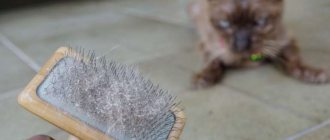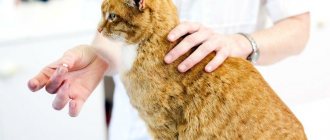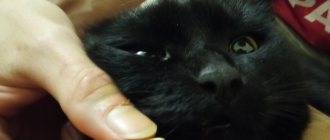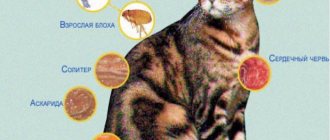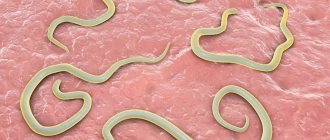Deworming of cats is the use of special drugs to treat and prevent an animal from helminths. Deworming of a pet is required only after examination by a veterinarian and according to a specific scheme, which will protect it from the occurrence of unwanted reactions from the body. Read more about the features of the procedure in our article.
Deworming of cats: features of the procedure
Why is cats dewormed?
This procedure rids your pet of any type of parasite that can cause irreparable harm to the animal. Worms constantly release large amounts of toxic substances into the blood that negatively affect internal systems. The pet begins to suffer from allergic reactions, loses weight and appetite, existing pathologies worsen, and manifestations of previous activity disappear.
The appearance of worms in a cat is accompanied by external manifestations of apathy and indifference to food
Carrying out therapeutic and preventive deworming rids your pet not only of adult helminths, but also of laid larvae and eggs. As a result, all symptoms of intoxication and allergies disappear without the use of other medications, which only remove the symptoms of the disorder without eliminating the underlying cause of the serious condition.
Why is it necessary to worm a cat?
Even pets can become infected with worms. There is a danger that the parasites will be transmitted to the owners. Worm eggs are quickly carried by fleas. The larvae can enter the body of a domestic cat from the soles of shoes, raw fish or meat. Parasites can cause serious harm to health, some of them are deadly. Deworming helps eliminate different types of parasites:
- Tapeworms and cucumber tapeworm. They grow up to half a meter and are attached to the intestines by suckers. They cause severe inflammation and are easily transmitted to people.
- Flatworms, liver fluke. They live in internal organs and cause serious disorders and lesions. Mostly they enter the body with fish. The pet experiences vomiting, jaundice, gastrointestinal problems, and hair loss. Parasites are transmitted to humans. He may develop cirrhosis of the liver or hepatocellular carcinoma.
- Roundworms (otherwise known as Toxocara) live in the intestines. Parasites greatly deplete the body and cause gastrointestinal disorders. Roundworms are especially dangerous for kittens, causing intestinal blockage and subsequent rupture.
Deworming also saves owners from irreversible consequences, especially if there are small children among them. First, signs of intoxication of the body appear, then destabilization of the internal organs begins, which leads to death.
Deworming saves not only from adult worms, but also from their larvae and eggs. Special preparations completely remove parasites from the body and do not allow them to gain a foothold. Other means not intended for these purposes only eliminate symptoms, which leads to a worsening of the condition.
How to determine when it's time to worm your cat
In adult cats, resistance to worms is high and it is sometimes difficult to determine their presence. If the worms are adults, they can be seen in the stool. However, small larvae or eggs are sometimes invisible. The main symptoms of parasites in your pet:
- fatigue, weakness;
- refusal of food;
- vomit;
- worms, from larvae or eggs in the pet’s feces;
- hair loss;
- restlessness, severe nervousness;
- sudden weight loss;
- intestinal disorders accompanied by diarrhea, constipation;
- bloating (it becomes dense).
However, some of the symptoms are similar to many diseases, so laboratory diagnostic methods are needed to determine the presence of parasites and their type. This is important for proper deworming.
Features of eliminating worms in pets
When carrying out the procedure, several important rules are taken into account to achieve the desired effect without harming the cat’s health:
- If there are several individuals in a house or in one area, all should be treated at once.
- Before deworming, it is necessary to check the animal for fleas. If there are any, you need to get rid of them. Fleas carry worm eggs, which can reduce the effectiveness of treatment.
- Pregnant and lactating cats are treated with great care. For them, it is necessary to select traditional methods of treatment. The use of aggressive medications against worms can cause pathologies in the kitten.
- Kittens up to three weeks from birth also cannot be treated and prevented against helminths, since their body is highly sensitive to any chemical.
Infusion of anthelmintic to a cat
Attention! If worm eggs are visible in the animal's feces, it suffers from vomiting, foams at the mouth, and there is bloating, you should select a drug to eliminate worms only with a doctor. Such symptoms indicate acute intoxication of the body and require mandatory therapeutic deworming to prevent death.
How to properly deworm a cat yourself
If there are several cats in one room at once, then deworming is performed for all of them at the same time. Before the procedure, pets are checked for fleas. First you need to get rid of them. Fleas quickly transmit helminthic eggs. As a result, prevention and treatment are ineffective.
It is not recommended to select medications on your own. Especially if the cat has bloating, vomiting with foam, and parasite larvae are visible in the feces. These are signs of poisoning of the body with waste products of parasites. Incorrectly selected medications in this case can cause the death of the pet.
How to give your cat deworming tablets:
- The medicine must be prepared in advance so that the cat does not see it.
- Wrap your pet in a blanket or towel with one head sticking out.
- Take the cat by the head with your thumb and forefinger (cover your face with your palm). With your other hand, pull back the lower jaw.
- Place the tablet in your mouth (on the root of your tongue). Raise the head and hold it until the cat swallows the medicine. At the same time, stroke her throat, causing a swallowing reflex.
- The pet may try to spit out the tablet. Therefore, you need to hold the cat until the owner is sure that the medicine has been swallowed.
You can use other methods as well. For example, crush a tablet and add it to food. Stuff the pill into a meatball, a lump of cottage cheese or other delicacy. You can dissolve the tablet in water and put it into a syringe. Then fix the position as indicated above and pour the solution into the cheek.
Frequency of antihelminthic treatment of pets
An animal should be treated for worms according to a clear schedule, which is usually agreed upon with a veterinarian. To set deadlines, the following criteria must be taken into account:
- pet's age;
- presence of chronic diseases;
- the presence or absence of pregnancy and lactation.
The first dose of anti-helminth medication should be given to kittens already on the 22-23rd day of life. Treatment and prevention are also necessary for a nursing cat; a safe anthelmintic is selected for it or traditional methods are used.
Kittens and cats that have given birth are at risk, since infection can quickly lead to intoxication
After primary therapeutic deworming, medication is repeated once every three months if the pet is constantly in contact with other animals and goes outside. It is enough to treat domestic cats in the spring and autumn, when the risk of contracting parasites is highest.
Transitional seasons are a fertile time for infection with worms
If the animal is undergoing surgery, deworming is carried out unscheduled. Parasites negatively affect blood clotting, which can cause massive bleeding during the procedure.
Attention! Since infection with helminths also occurs in utero, the cat should be well dewormed before mating if more than three months have passed since taking the medication. This is done two weeks before mating.
Drugs that take into account the baby’s age
What to give a kitten for worms? Veterinary pharmacies are ready to provide a large selection of anthelmintic drugs for kittens, but you should not rely on the experience of a cat pharmacist when choosing the right drug, even if he is an experienced veterinary pharmacy employee. We rely on the doctor's recommendations. When buying a product, pay attention to the shelf life, never buy the medicine in random places , but only in certified pharmacies, otherwise, at best, it will be useless, and at worst, it will harm the kitten.
Let's look at deworming medications prescribed to kittens as they grow older:
- Two weeks: Dirofen;
- Three weeks for a kitten: Kanikquantel, Prazicide in suspension, Trontsil K, Drontal in tablets;
- Five weeks: Profenler drops;
- Six weeks: Milbemax;
- Month: Polyvercan-sugar cubes;
- Three months: drops on the withers Inspector, tablets: Pratel, Polyvercan, Fetabl.
Remember: medications for a kitten are selected by a veterinarian individually, taking into account the age, breed and other characteristics of the baby. New generation drugs have significant advantages, rarely cause allergies, and have few side effects.
Is it necessary to worm an animal before vaccination?
Deworming before vaccination is a mandatory measure, which is carried out if the last treatment was more than 4-6 months ago. In this case, the administration of anthelmintics is organized according to a special scheme, which provides for a two-time dose of the anthelmintic.
Delayed deworming can lead to serious complications
The first dose of the selected drug affects the activity of adult worms, killing or paralyzing them. After 10-14 days, repeated treatment is carried out, which allows you to destroy the larvae and eggs, as well as the remaining mature parasites. Vaccination after treatment is possible only after two weeks, when the toxin from the antiparasitic agent is completely eliminated.
Lack of results with a two-phase treatment system may indicate an erroneous diagnosis
If you do not deworm the animal before vaccination, it may experience severe damage to the body in the form of kidney dysfunction, massive intoxication, vomiting, diarrhea, and acute allergic reaction. Death is also possible.
Attention! If, even after using the antiparasitic drug twice a day, the cat still has signs of helminths in the body, you should consult a doctor. The veterinarian will recommend another drug and recheck the diagnosis.
Is deworming necessary before vaccination and sterilization?
If a healthy animal has to undergo a planned surgical intervention (sterilization or castration), it is necessary to provide him with conditions for a speedy recovery. The body of a cat affected by worms is weakened, so the risk of postoperative complications is high.
Worming your pet before surgery is a necessary and mandatory measure to protect its health.
Vaccination is also carried out only for absolutely healthy cats. Worm infestation is one of the contraindications to vaccinations. Regardless of whether symptoms of worms are present or not, it is necessary to worm your pet before vaccination.
If a young cat is to be sterilized, the presented scheme of prevention, routine worming and vaccination will be very useful:
- at the age of 2–3 months, kittens receive their first vaccination; the cat should be dewormed at least 10 days before vaccination;
- After about a month, re-vaccination is carried out;
- after changing teeth, kittens are again supposed to be dewormed, and after 10 days they undergo a routine vaccination;
- after 2–3 weeks, if the animal is in good health, a sterilization operation is performed.
Consequences of lack of deworming
The presence of worms in an animal’s body poses a real danger to the life and health of cats. Parasites are able to penetrate all internal organs, including the heart, liver, brain and spleen. Parasites quickly grow and multiply, taking all useful minerals and vitamins from the tissues.
Animals infected with parasites quickly become depleted if not properly cared for.
As a result of such exposure without the use of anti-worm medications, the following consequences may develop:
- blockage of channels and passages in organs;
- ruptures of the lining of the intestines and stomach;
- a rapid decrease in the body’s defenses and exacerbation of chronic disorders;
- a drop in hemoglobin levels due to the constant release of toxins by worms;
- the appearance of seizures and lack of appetite;
- impaired respiratory function, most often manifested in the form of shortness of breath;
- weakness and apathy;
- When the brain is damaged, partial or complete paralysis may occur.
The most severe consequence of untreated helminthiasis is paralysis
Attention! Parasites from cats easily enter the human body. Once infected, people experience the same negative symptoms as animals.
Visible and hidden results of treatment
The therapeutic effect is most often achieved with a single use of the drug - this is more than 90% of cases. After treating the kitten, we constantly look into the tray: are there any worms? It is not always possible to see them in the feces; if the kitten has been infected with a small number of helminths, then they are digested in the intestines and are not visible in the tray.
There is a common belief that the more worms found in the feces, the more effective the treatment, but a similar picture is observed precisely when the animal is simply infested with parasites, and repeated treatment is inevitable. If the infection is severe, the helminths may be released through vomiting.
© shutterstock
You can find out for sure about the “expulsion” of worms from a cat’s body only by having its feces analyzed. But visually, in case of successful treatment, there will be a noticeable change in the baby’s appearance, his playfulness will increase, his appetite and stool will improve.
In case of successful treatment, for complete recovery and protection from relapse, you need to take some preventive measures.
The dangers of deworming
The procedure is harmful to the animal only if the owner does not follow the instructions and uses the anti-worm drug on pets for which it is prohibited. In this case, the cat may develop truly dangerous health consequences:
- severe vomiting and diarrhea;
- if there are problems with stool before treatment, medications lead to intestinal failure;
- foaming from the mouth and kidney problems;
- rapid drop in body weight;
- bleeding in the digestive tract;
- a sharp drop or rise in blood pressure;
- shortness of breath and difficulty breathing, up to a complete stop;
- congenital malformations in kittens if a pregnant cat has been wormed;
- severe allergic reactions, including anaphylactic shock.
In advanced cases of worm infection, deworming can be fatal.
Attention! In severe cases, when the individual is very weak, after taking an antiparasitic drug, death may occur due to multiple organ failure. In this condition, there is a failure of all body systems with the impossibility of restoring their function even in a clinical setting.
When to carry out processing
There is no doubt that anthelmintic measures should be carried out when the first signs of infestation are detected. In this case, you cannot hesitate: the sooner treatment begins, the fewer risks to the cat’s health.
Modern anti-invasive drugs make it possible to deworm kittens from one month of age without harm to their growing body. A responsible owner will strictly adhere to the preventive worming schedule - once every 3-4 months. These activities should be continued throughout the pet’s life.
Quite often situations arise when an extraordinary procedure is necessary. You will have to worm your cat:
- at least 10 days before the intended mating;
- at least 10 days before scheduled vaccination;
- 3–4 weeks before sterilization or castration surgery;
- after the end of lactation of a nursing cat.
Antihelminthics for cats
There are a large number of medicines that are used for therapeutic and preventive deworming. They differ from each other in the active substance and its dosage. Contraindications usually include pregnancy and lactation, the presence of severe kidney and liver disorders, and the pet’s age up to three weeks.
In the developing fragile organisms of kittens, pathological changes can occur with inadequate drug therapy
Table 1. Antihelminthic drugs and their effect
| Name | Release form | Dose | Action | Admission course |
"Azinox" | Pills | Selected at the rate of 1 ml/kg | A broad-spectrum anthelmintic, used against sexually mature individuals and their eggs. Causes paralysis of harmful organisms and their removal naturally | The medication is given once in the morning |
"Bars Spot-On" | Drops for withers | Cats up to two kilograms require 0.2 ml of solution. From 2 to 5 kg, 1 ml of concentrate is used. If the cat weighs more than 5 kg, 2 ml of the active substance must be prescribed | A broad-spectrum antiparasitic agent, available in the form of drops for use on the pet’s withers. The drug contains praziquantel and ivermectin. At the same time eliminates infestation by fleas, lice-eaters, ticks | Can be used once |
"Dironet" | Tablets and suspension | Cats are administered Dironet at a dose of 1 ml/kg. The suspension is prescribed in the same quantity | Refers to a broad spectrum of anthelmintics used for the prevention and treatment of individuals. Ingestion of the active substance "Dironet" leads to paralysis of adult parasites, eggs and larvae. They are then excreted naturally | Treatment and prevention are carried out once |
"Dirofen" | Pills | Kittens take Dirofen at the rate of one tablet per kilogram of weight. Adults take treatment at the rate of one tablet for every five kilograms of weight | It has a paralyzing effect on adults; fenbendazole eliminates the activity of larvae and kills parasite eggs. The composition of the drug includes pyrantel and fenbendazole, which are considered as safe as possible, provided that the dose is selected correctly. | The appointment is one-time only. It is recommended to take the medicine in the morning |
"Drontal for cats" | Tablets, suspension | 1 tablet of medication per 4 kg of body | Effective against most parasites. The tablets contain pyrantel embonate and praziquantel. The first substance has an effect on adult parasites, praziquantel enhances its effectiveness and eliminates immature individuals and larvae | Apply once in the morning |
"Kaniquantel plus" | Pills | 1 tablet per 10 kg of body. For cats it is usually recommended to reduce the amount of active substance by half | It is most often used for mixed helminth infections. The composition contains two active substances – praziquantel and fenbendazole. Both components are active against sexually mature parasites, larvae and eggs | The solution must be taken in the morning along with food immediately and once |
"Panacur granulate" | Pills | Kittens are prescribed the medication at 225 mg/kg, adults receive a dose of 450 mg/kg | Suitable for treating weakened individuals and small kittens. The active substance fenbendazole has a toxic effect on parasites, causing their exhaustion and death. Allows you to get rid of parasites located in the lungs and intestines | Taken once in the morning with the first meal or before it |
| "Piradek" | Suspension | 1 ml/kg body. If the cat weighs less than 500 grams, another 3 ml of warm boiled water must be added to the measured dose of the active substance | The suspension contains pyrantel pamoate, the main effect is on adults and larvae. You may need to take a stronger medication to eliminate the eggs. Pyrantel pamoate has a paralyzing effect, after which the parasites are eliminated from the digestive tract naturally | Apply once in the morning |
"Poliverkan" | Sugar cubes | Cats up to five kilograms need to take 0.5 cubes. If the animal weighs from 5 to 10 kg, the dose of medication is 1 cube | Broad-spectrum anthelmintic. "Polyvercan" has a direct effect on all parasites, depleting them, which ultimately leads to the death of the pest | The prophylactic dose is one-time; it is better to give the medication in the morning with the main meal. During therapeutic deworming, the medication should be given again after 10 days. |
"Prasicide" | Tablets, suspension | 1 tablet per 3 kg of weight. If the cat weighs less than this weight, the tablet should be crushed | A specially developed medication against tapeworms and roundworms in cats. Prazicide contains pyrantel and praziquantel. Has a paralyzing and debilitating effect, which ultimately leads to the death of the parasite | Apply once in the morning |
"Profender" | Drops on the withers | If the animal weighs from 500 g to 2.5 kg - 0.35 ml; with a cat weighing from 2.5 to 5 kg – 0.7 ml; with body weight from 5 to 8 kg – 1.12 ml; if the cat weighs over 8 kg, you need to select a combination of pipettes at the rate of 0.14 ml/kg | An anthelmintic agent with complex effects. The medication contains emodepside and praziquantel. | Treatment is one-time only |
Attention! If there is a high probability of infection or therapeutic deworming is carried out, after 14 days you can repeat taking the medicine against worms. Repeated treatment is always carried out if the pet has been diagnosed with ascariasis. Additional information about roundworm in cats can be found on our portal.
If you are having difficulty getting your pet to take pills, here are some helpful tips to make it easier for your cat to take medication.
Getting your cat used to taking pills
Types of helminthiases
Helminthic diseases in cats are caused by different types of helminths, differing from each other in size, shape, methods of reproduction and feeding. Most helminths are dangerous to human health, so it is necessary to clearly familiarize yourself with each type of worm.
Helminthiases are divided into 3 main groups:
- Cestodes (tapeworms). Worms have a flat body, the length of helminths varies from 10 cm to half a meter or more. The body of the worm consists of many segments (segments) in which helminth eggs develop.
- Nematodes (roundworms). The body length is usually from 2 mm, but in some advanced cases of the disease, nematodes can reach a length of up to 10 cm. Helminths live mainly in the small intestine, feeding on the blood of their host. Often, it is with nematodes that the cat suffers from severe anemia.
- Trematodes (flukes). Parasites of this species are much less common than cestodes or nematodes. Penetrating into the animal's body, flukes parasitize the liver or pancreas, leading to severe disorders of organ function.
Tapeworms that live in the body of cats cause diseases such as dipilidia (a helminth reaching a length of about 70 cm, localized in the intestines), diphyllobothriasis (the length of the worm can be more than 1 m, lives in the intestines), alveococcosis (a tape parasite with a length of body about 4 mm, develops in parts of the intestine).
Nematodes lead to diseases such as hookworm (a worm about 2 mm in size, feeds on blood), ascariasis (the length of a worm is from 2 to 5 cm, lives in the liver or intestines of a cat), toxocariasis (a helminth that lives in the intestines).
Trematodes cause diseases such as fascioliasis and opisthorchiasis. Helminths parasitize mainly in the bile ducts of the liver and pancreas. Flukes have a small body size and powerful suckers, thanks to which the parasites attach to the internal organs of the cat.
All helminthiases are dangerous to the health of cats; for example, a disease such as toxocariasis can be transmitted even through mother's milk from cat to kitten. A sick kitten, in the absence of timely treatment, usually does not live long. In addition, there are known cases of toxocariasis infection in humans.
Cestodes pose no less danger to both the cat and its owner. In most cases, tapeworms are not easy to get rid of. The worm has a scolex with hooks, with the help of which it firmly penetrates the intestinal walls of the victim. Often, after the deworming procedure, the parasite dies, and the scolex remains inside the host’s body. After a few weeks, a new parasite body develops from the remaining part. It is necessary to fight cestodes only with powerful anthelmintic drugs.
Deworming with folk remedies
They are considered less dangerous for cats and are suitable even for pregnant cats. Despite the absence of aggressive substances in the composition of non-traditional anthelmintic drugs, it is better to coordinate their use with a veterinarian.
Table 2. Traditional methods against worms in cats
| Ingredients | Cooking method | Dosage | Admission course |
Chamomile or fennel | Grind a teaspoon of any raw material, pour 200 ml of boiling water over the herb, leave for 20 minutes and strain | Give instead of water in a drinking bowl, pour 5-10 ml of solution into the mouth up to five times a day | Every day for a week |
Bulb | Take a medium onion and cut it into 4 parts, pour 200 ml of boiling water over the component, let stand for 20 minutes and strain | In the morning on an empty stomach, 10-20 ml | Every day for a week |
Tansy | Grind a tablespoon of raw material and pour 250 ml of boiling water. leave for an hour, cool and strain | Give 10-20 ml an hour before meals three times a day | Every day for a week |
Alcohol infusion of wormwood | Purchased at a pharmacy | 5-10 drops in the morning and evening an hour before meals | During one week |
Carrot | Strain freshly squeezed carrot juice without pulp, using a soft enema, pour it into the animal’s anus | 10-20 ml of juice depending on the size of the cat | Once a day for a week |
Garlic | Chop a small clove of garlic and mix it into the cat food | No more than one slice per day | During one week |
Attention! Folk remedies against worms for cats are relatively safe. They do not cause intoxication, but can provoke allergic reactions.
Methods
Every owner should know how to properly deworm cats with different drugs. Some animals calmly eat food to which the medicine has been added. But if you can’t feed the cat this way, then there are other methods.
A calm animal should be seated nearby, its mouth should be carefully opened and the tablet should quickly be placed far away on the tongue. After this, the mouth is closed and, lightly stroking the pet’s neck, they force it to swallow the medicine.
But if the cat behaves restlessly, then the tablet must be crushed and diluted with water. The resulting suspension is drawn into a small syringe without a needle. The animal is wrapped tightly in a towel, its mouth is opened and the drug is injected into the cheek. The cat is released only after it has swallowed everything.
It is convenient to deworm an animal using drops. They are applied to the withers so that the cat cannot reach them with his tongue.
A veterinary clinic can give you an anti-worm injection.
How to give the tablet to cats and kittens?
If you want to cure a kitten, it is better to immediately buy a liquid suspension. When it is necessary to cure worms in an adult animal, tablets should be given in one of the following ways:
- The cat should sit with its back to you; it is better to sit it on your lap, since when trying to escape, the animal begins to back away. With one hand you should unclench the cat's jaws, with the other you should put the deworming drug into the mouth. Then stroke the animal's throat to trigger the swallowing reflex;
- You can crush the tablet and dissolve it in liquid. Pour the resulting mixture from a syringe without a needle behind the cat’s cheek, gently hold its muzzle so that it does not spit out the medicine;
- the cat is ready to swallow even an unloved treat if you show extra affection, pet it and talk to it. The crushed tablet can be mixed with liquid food, boiled minced meat or chopped meat, then given to a kitten or cat;
- You can treat a particularly violent pet for helminths in this way - wrap it in a blanket, leaving only the head exposed. Place the cat with its back facing up to prevent choking. After that, use method 1 or 2;
- You can worm a cat without it even realizing what happened. To do this, you can use a small piece of butter into which you need to roll the tablet. Place this pellet in the freezer for 10-15 minutes. Use the swaddling method, making sure your cat swallows the oil.
Helminths in the animal's body
Some types of helminths only affect animals, but there are also those that are dangerous for both pets and humans. Therefore, deworming should be planned and systematically carried out in every family with a dog or cat.
Even if an animal is exclusively domestic and never goes outside, this does not mean that it cannot become infected. Often, worm eggs are carried home on shoes - keeping the soles of street shoes and the floor in the hallway sterile is beyond the power of even the most hardworking housewife. Infection also occurs through raw food: meat, fish, eggs, vegetables, herbs.
Helminths can remain asymptomatically in the body of a dog or cat for a long time. And it manifests itself already at a late stage of infection, when the animal begins to refuse food, lose weight, vomit or diarrhea. To prevent such developments, animals are dewormed several times a year. From medications taken for preventive purposes, the harm is minimal, compared to serious helminthic infestations that can infect not only a pet, but also all family members, including small children.

